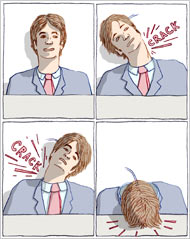Vigorous shaking of the neck can lead to stroke
For a long time, we still have a habit that when we are tired, we often shake our neck vigorously to relax our muscles and increase pleasure. Few of us think how harmful it is.
Years ago, neuroscientists announced a strange case of people who treated it with soaking, especially neck problems.
 According to the theory of neuroscientists, chiropractic techniques called soaking, which involves using a strong shaking of a person's neck, can jeopardize two main arteries from the neck to the back of the brain. People under the age of 45 rarely have a stroke, but if the arteries suddenly break, they can have potentially dangerous consequences.
According to the theory of neuroscientists, chiropractic techniques called soaking, which involves using a strong shaking of a person's neck, can jeopardize two main arteries from the neck to the back of the brain. People under the age of 45 rarely have a stroke, but if the arteries suddenly break, they can have potentially dangerous consequences.
These studies are intended to indicate a relationship. In a survey of 55 patients with a sudden stroke after suspicion of rubbing, massaging the neck. At the same time, in the journal Neurology also said that young stroke patients usually spend 5 times / 1 week to soak and massage. They estimate that for every 100,000 people under the age of 45, there are about 1.3 people who must be hospitalized for disorder.
A recent study calculated that there were about 818 cases related to arterial rupture at the back of the neck. Before a stroke, young patients often had a feeling of head and neck pain - this symptom was predicted to be a stroke - but they did not pay attention and sought a method of soaking to comfort and more comfortable. They do not think that this facilitates a faster stroke.
- The 23-year-old girl is half-paralyzed because of an action many people do when tired
- Why don't fish have neck?
- What to do to avoid disability after stroke?
- Anoxic brain due to stroke can lead to Alzheimer's disease
- Common mistakes when giving first aid to people with stroke
- 8 common questions about stroke you should keep in mind
- Solar powered shaking cars for people with disabilities
- The old Chinese only spoke English after a stroke
- An enlarged neck artery reduces the risk of stroke
- How not to die unjustly because of the wrong stroke with the wind?
- Pain in the neck, shoulders, or neck is not caused by sitting in the wrong position!
- 40% of people with transient ischemic stroke
 Green tea cleans teeth better than mouthwash?
Green tea cleans teeth better than mouthwash? Death kiss: This is why you should not let anyone kiss your baby's lips
Death kiss: This is why you should not let anyone kiss your baby's lips What is salmonellosis?
What is salmonellosis? Caution should be exercised when using aloe vera through eating and drinking
Caution should be exercised when using aloe vera through eating and drinking